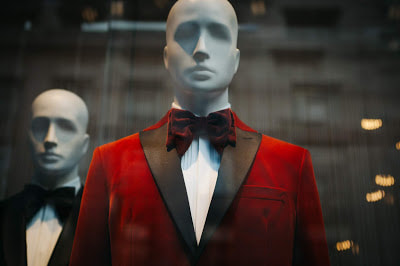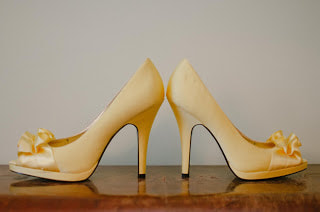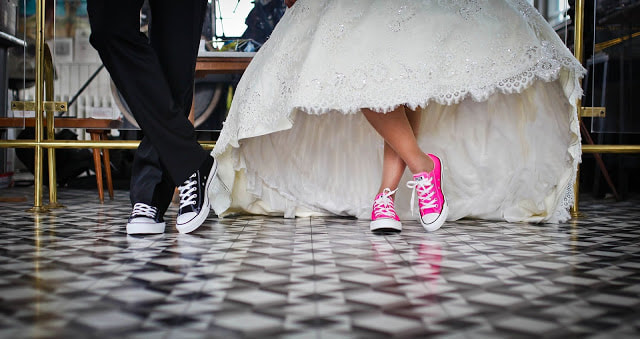Giggles y Yoby Tommy Villalobos Giggles walked like she was dancing to Oldies But Goodies, Volume One. But she also looked sad all the time. It was like she wanted to be sad. Her friends already had a Sad Girl so they called her Giggles. People called me Gordo. I wasn’t fat. Maybe just a little. But let me get back to Giggles. She was the finest one in the Projects, 1950’s. One day, Lil’ Chango, skinny with a face that not even a madre could love, tried talking to her. He was barking like a seal up the wrong playa. I looked at her face when she was listening to the bato. Her lips were twisted. Like he was making funny noises with his nariz. He walked away with his head looking down, like he didn’t care if a carucha hit him. She looked at me and I made a serious face. Inside, I was laughing like when I saw that cartoon where the coyote gets hit by a giant rock when he’s chasing the pájaro loco. Giggles started walking again with that special wiggle. I wanted to tell her something like a priest. I walked fast. “Hija, you can tell me,” I said. She turned to look at me like I was a cucaracha walking around her sopa. “I don’t know you.” “I want you to.” “I like someone.” “Never saw you with someone. Never saw you with anyone.” She looked at me like I was another cucaracha but this time in her sopa. “Are you following me around?” “Even when I sleep.” I was trying to sound romantic like in a song. “Don’t!” “All girls like being looked at.” “Not me.” “We’re meant to be.” “Uh-uh.” She walked quickly away. Almost ran. People could ask me why I didn’t give up. You know, chase other girls who liked gordos. I would tell them that girls act in different modos. They can hate you but then you say or do something they really like, they grab you and put your arms around them. You feel like an octopus wearing a Pendleton. “Where have you been, Felipe?” said my mother as soon as I walked in the door. “Getting fresh air.” “There isn’t any.” I wanted to tell her about Giggles but she might not like her walk. “Áma, I like this girl and—” “She won’t be the last.” “This one is the first and only. She is special.” “She lives in Beverly Hills?” “Huh?” “Take out the garbage.” I took the garbage outside. A chavalo called Freddie saw me. “Hey, Phillip,” he yelled. He was the only one who called me by my name. “What?” I said to the mocoso. “You want to play baseball?” He didn’t see that I was grown up. Baseball was for chavalos. Girls were more fun now. “Freddie, I like girls now,” I said like I was confessing to a priest. “What?” Freddie was stunned, making a cara like I said I liked wearing dresses now. “One day, you’ll throw your baseball to your sister because you won’t be able not to.” I really thought of saying that because his sister Lydia was a better baseball player than him and she was only seven. “You’re talking crazy, Phillip. Go get your mitt, let’s play.” “Maybe later,” I said, knowing “later” really meant never. He turned and walked away. He turned back to look at me as if he wasn’t sure who I was. Then he disappeared into the Projects. I felt kind of sad. Like my childhood was disappearing with him. Then I thought again about Giggles and I wanted to kick Freddie and my childhood further into the Projects. God made something more fun than baseball. Then my friend since I forget how long, Jimmy, saw me. We were the same age. He was more serious than me. Of course, my mother would say everyone was more serious than me. Jimmy loved math and collecting baseball trading cards. His cards took up most of his life. And the girls all looked at him like he was Elvis. It didn’t seem to matter to him. He spent his time with his math books and cards. Everything else was for other guys. “Gordo, why are you standing there?” he said. “Thinking.” “About what?” “Not sure. Where are you going walking all fast?” “My mom needs butter.” “You still run mandadas?” “Sure. You don’t?” I nodded slowly. “Jimmy, oh, Jimmy!” said a high voice belonging to a running flaca with flying pelo. It was Lorna Ritas. She was in a race for Jimmy with Sally Lomenez, Linda Mistasosa and Maria Lobermie. They had a better chance with the real Elvis. Jimmy barely said “Hi” to them but each time they took it like he wanted to make out with them at Belvedere Park. Like that song, Jimmy only had eyes for Rachel Apenuz. Rachel Apenuz had no personality I could see. Jimmy saw something the rest of the world didn’t, like in those spooky movies. Compared to Rachel, Giggles was a shiny pair of spit-shined calcos. Rachel was like my sister’s paper dolls she used to play with. She was like cardboard. Her hair looked tired. In fact, she looked tired. But I was glad Jimmy didn’t see Giggles. Then I panicked, my mouth turned dry. Maybe he hadn’t seen her glide like a lowered carucha down Brooklyn and Mednik. “So, are any new girls waving at you?” I said, my mouth even drier now. He looked at me like I said something in Chinese real fast. “New girls?” “Yeah, like hot off the comal?” “What are you talking about?” “Is Rachel still your, you know…?” He nodded with a strange smile. “I still like Rachel.” I could breathe normal, again. Jimmy’s sister whistled for him from away off. She had the loudest whistle in the Projects. Jimmy ran off. I went back inside. I played “Earth Angel” by the Penguins on my sister’s record player. I played it over and over. The title said what I wanted to sing to Giggles. Then I fell asleep on my sister’s cama. The record player needle was stuck on the end of the record. “What are you doing?” my sister screamed, making me jump. My heart wanted to leave my chest and jump out the window to find somewhere better to live. “Man,” I screamed back, “you nearly gave me a heart attack.” “And I hate to fail. Now I’m really mad.” She got good grades in school. I think that’s why she said that. But she also had a big mouth my mother was always trying to slam shut. Hearing my sister’s big mouth, my mother came running like my sister was on fire. “¿Qué está pasando?” she screamed louder than even my sister. “I have to wash everything,” my sister said, looking around the room like I spread pulgas all over. “Don’t exaggerate,” my mother said. “He’s a pestoso,” she screamed in her chavala voice so all the Projects could hear. I think all the people in the Projects were smelling the air. My mother was quiet as if my sister said something like the president. “I was only playing a record,” I said, explaining things to the judge, my mother. Like a bailiff, my mother escorted me out of the room. My hermana had a crooked smile. The door slammed behind us. I would aim pedos into her room next time she wasn’t home. To feel better, I went back outside. In the Projects you always ran into someone who either made you laugh or was madder than you. Right now, it was Pete. He never made you laugh or mad. But he always had a problem to share. I tried telling him that was why he had a mother. That’s how they got gray hair. But today, I think I caught him at a moment when people feel like unloading a problem on the first person they catch. “Gordo,” he said, “I have a problem.” “You’re the last bato I would guess had one.” “What?” “What happened?” “I met the finest weesa ever made.” “Ever?” “Ever.” “Why?” “When you see her walk, it’s like seeing the ocean at Long Beach.” “Go write a poem.” I said. It sounded like he was talking about Giggles and I didn’t want to hear. “I have to win her heart first.” Pete wasn’t a bad looking guy like some of the truly ugly ones around, but right now he looked like the ugliest feo of all time. “I love Giggles,” he continued and I wanted to give him a Popeye-sized cachetada. “Who is ‘Giggles’?” I said with a shaky voice. I was a nervous liar. “She is a walking angel, like in the song, ‘Earth Angel’.” He said this with a stupid, faraway look. “You okay?” he then said. I felt mad then sick then mad again. “Sure.” “Are you sure-sure?” “Sure.” “My problem is that she is related to Jimmy and likes Loco.” I sat on the sidewalk. I saw Loco’s crooked right eye. I think he hated the world and everyone in it because of that eye. He was born that way. God wanted him to look loco so he took the hint and became one. “You look weird, man.” “Why Loco?” I croaked. “That’s what I want you to tell me. He is one ugly bato with an even uglier way with people.” “And she is Jimmy’s cousin?” He nodded weakly. “How do you know that?” “My sister.” “Oh, yeah. Your sister Rosie talks with everyone about everyone. The Queen of Maravilla Chisme.” “Hey, that’s my hermana.” “Everyone knows Rosie, Pete.” “Yeah, but you’re wise.” All those times talking to Pete, I was mostly trying to get rid of him. “So, what do you think?” he said. He wasn’t going nowhere till he got an answer. “Loco has that name for a reason. Jimmy is probably thinking of a way to stop his prima from getting hooked up with him.” I said that for myself. “What do you mean?” “He wants to stop him.” “Oh.” I always liked hearing Pete say “Oh.” It meant he was accepting what I said and would go away. Not today. “You know, Jimmy invited Loco to the show with Giggles?” I lost my words and thinking. Pete batted for me. “I saw them walking back to the Projects after they got off the Kern bus. Loco was laughing like a hyena.” My mother said life has surprises. One just kicked me in the head. “Should we jump him?” said Pete. “He would wrap you around me like a pretzel.” “So, what are you going to do?” he said. What I wanted to do was pluck Loco’s good eye out and do a pachuco hop on it. “It’s up to you.” “Then what should I do?” I felt like I was running his life when he should be running his own. “Find another one.” “Another what?” “Chavala.” “There ain’t no other around,” said Pete, looking around as if to prove it. “All good times don’t lead to Giggles.” At this point, I think I was again giving advice to myself. “Yes they do.” “What if she hates you? And your family? And your dog.” “She don’t know me. Or my family. And this is the Projects, we can’t have a dog.” “Maybe she has a drinking problem. She’ll start making ojitos at other batos.” “How do you know she has a drinking problem?” “Just looking at all angles.” “She could wet her bed, chew food with her boca wide open, have a voice like Jimmy Durante, and I would still like her.” “What if she has a record?” “Even if she was serving life at juvie, I would still visit her every day.” He was almost as crazy over her as I was. “Don’t you have a girl you liked? What about Edith?” “Edith was in the second grade. Her family moved out of the Projects when I was nine.” “Too bad.” “Huh?” He looked at me real let down. He walked away. I went and sat on my porch. I saw a girl coming toward me on the sidewalk. She was walking like a wave at Long Beach, like Pete said. It was Giggles. “Hello,” I said, trying to sound like some actor I heard in a movie. She kept walking like I had been a squawking perico. I was hoping for a “Hello” back or at least her head to turn up all conceited. But she kept walking. But then for a little bit, she turned her head toward me. Not mad or happy. Jimmy would make everything right. He would talk to his cousin and tell her that he and I were closer than gum under a zapato and she should grab me, crying. Jimmy said that they were cousins when he came to the door. “So, she just likes him like a cousin?” I said. “She and Loco are closer than gum in your hair,” said Jimmy. “So she likes him like a favorite cousin?” “She likes him like she likes to kiss him.” “That’s all?” “He kisses her back.” “You know Loco. You know what he’s like.” “Since we were babies.” I swallowed hard. Then I swallowed hard again. Then a third time and maybe a fourth. “You look like you swallowed a moco,” he said. “Why do you even know him?” “He’s my step brother.” Jimmy didn’t even say that like he was sorry. “Why?” “I don’t make the rules. Loco’s dad married my mom years ago. My mom had kids. He had one, Loco.” “So he can’t love Giggles?” I said. “Why can’t he?” “Because.” “She is my cousin but she is nothing to Loco. Well, that could change, but that doesn’t keep them from liking, maybe loving each other and making a whole bunch of kids to spread around Maravilla.” “That shouldn’t be allowed.” “What?” I walked away, stomping on the ground like it was Loco’s ugly ojo. I went to Pete’s house to report. He opened his door then smiled like if I was going to say that Giggles loved him. I broke the news over his head. But it was my own cabeza that hurt.  Tommy Villalobos was born in East L.A. and also raised there. He thinks of the lugar daily and love the memories while remembering the tragedies of his neighbors and of his madre. Tommy’s mother had a great sense of humor and he inherited about ten per cent of it. She had a quick wit and response to all verbal attacks, whether to herself personally or to her Catholic religion that she loved. Tommy dedicates all his works to her, knowing she had him when she had no idea how she was going to feed him and his four siblings. She was a single mom until the day she died. He lives in a boring suburb now, outside of Sacramento, but his heart and soul will always be in East Los Angeles where his mother was always by his side to protect him.
0 Comments
This feature first appeared in Somos en escrito on January 11, 2017. Guess who wins!Excerpt from Outline for Love, a novel By Tommy Villalobos Chapter One Mona Rinistor stepped out of her office for a breath of fresh air. Chava Absuena, likewise, stepped out of her office for one reason or another. She was not sure. Mona had been in the same office complex for several years, although it felt like only a few months. Chava had been working in her office for several hours, and it seemed like several years. The offices opened out into the second floor balcony and city smells and ruidos. Mona walked toward Chava. Chava, in turn, wanted to turn and dart back into her office. She thought Mona was some kind of dueña, for Chava had bad experiences with bosses and landladies. Her first job was at an ice cream parlor in Nogales, Méjico. Then a beauty parlor in Juarez. Then a poker parlor in Amarillo. Then the Sunshine Tattoo Lounge in San Diego. She also had to stretch her paychecks. When a landlady was close at her heels, Chava, a quick packer, hopped on a bus. Now Chava Absuena worked in a fashion parlor in Los Angeles. This time her dueña was a dueño, Max Lipiz. A few writers in the past, Thomas Hardy dancing among them, have pointed the ironies of life. Here was one. Max was a barrio sort who, for some reason (his Tía Minstra Telamacundra said it was due to a good kick to the head he suffered when a boy at the hands of some primo), decided one beer-soaked evening at The Green Bar to become a women's fashion consultant. His friends said it was just to get girls. He said it was simply his chosen career path. His Tía Minstra reminded him that his whole family from his father's side going way back before the Treaty of Guadalupe Hidalgo was a family of contented carpenters. The fact did not move him. “Hello,” said Mona, sticking a hand toward Chava before she could close the door. “Hi,” said Chava defensively, hesitating before sticking out her hand from the small space left by a nearly closed puerta. Mona had to reach for it and their fingers barely made contact before Chava withdrew hers behind her back as if to prevent Mona from grabbing it again. “Do you work for the Women's Fashion Consultant?” asked Mona looking at the sign on the door. Chava followed her eyes to the sign on the door as if to confirm that Mona had correctly defined the sign. “Yes,” she said with hesitation as she looked back to Mona. “Are you her?” “Not even.” “Where is she?” “She ain't anywhere.” “We all gotta be somewhere.” “Not her.” “Huh?” “My boss is some guy.” “Now is he?” Chava nodded vigorously as if to latch on to stark reality. “Interesting.” Chava drew a blank. She then tried to phantom in her mind what was interesting. “So you just started working for him?” said Mona. “Uh-huh.” “How many people work here?” “Just me.” “Are you his partner?” she said while appraising Chava's purple abstract printed tunic and faded denim leggings. “No. I just answer phones.” “Oh.” On cue, the telephone rang. Chava stared at Mona as if wanting direction. “I better let you answer that,” said Mona, giving her some. Chava closed the door. Mona slowly walked back to her office, the office of a thriving accountant. Mona thought. Rules change. I deal with cold numbers and here's a homey who deals with warm figures. Go figure. Mona had spent her early life in and around East Los Angeles since birth. Her brain then took her to Villanova then to various parts of the world, including Houston where she obtained her first employment with an accounting firm that accounted for big perfume, little diapers and mediocre law firms. Tiring of endless parties and shopping sprees, she decided to come back home and account in L.A. “Welcome home, mija,” her mother had declared when Mona returned home. “We have your room ready and your father is inviting his best friend's hijo to meet you. He is a metal polisher and makes good money to support you and all the chavalos you're going to push out.” Mona had already secured a condominium along the beach at a good price. How does one tell amá and apá that the nest is even a tighter fit than before? Way Numero 1: Mom, dad, I have been to three colleges, two countries, four states and several republics of various political persuasions, if one interprets that word loosely, so home would be a lame environment. Way Numero 2: There are not too many big accounting firms in our Hood. Way Numero 3: I need my space which apá considers met by an 8 by 8 foot bedroom, dinner and a sala with plenty of boxeo and one or two telenovelas. Way Numero 4: One outing a year to visit parientes in San Fernando is not the social life I envision lasting until my dotage. Way Numero 5: I like my privacy, which is nearly non-existent with family, neighbors, and dad's ne'er-do-well amigos parading through the house at all hours. Mona, with a frowning father and a disappointed mother, set up homemaking by herself—and eventually one aquarium fish—in a roomy place with a great view of Pacific sunsets. The life of a successful accountant, certified, and daughter, not certified, pleased her. Therefore, Mona floated into her office every weekday morning, gathering accounting accounts as little girls gather daisies. She had a knack for selling her skills that she developed at nine when she made Christmas ornaments and sold them outside of supermarkets. From there, she began making little trinkets and selling them outside of bars where men snapped them up to give to girlfriends and even wives. Then she washed perros but no gatas because of one scratch she got on her forehead, which, to this day, she claims is a scar she will carry forever. No one has ever seen the scar but she claims, nonetheless, it is there. Back in her office, Mona went to her desktop and began in earnest an accounting services proposal for one women's fashion consultant. He has one employee, one office and seems to have no clientele in sight. She was witness to one phone call, which could have been a wrong number, or worse, from family. At the same moment, Max Lipiz was in front of his cracked mirror in a trailer he rented. The old, rusty trailer sat behind an iron works shop, which sat behind an auto paint shop that sat behind a pickle factory. This made for absorbing and enchanting noises and odors that floated into his trailer round the clock. He dressed meticulously, spending nearly all his money on clothes and accessories that make the man, for who wanted an unkempt slouch advising them on fashion, especially women. His rent was minimal as well as his eating. He was slim, neat and eager. Only his nose gave away his gaunt figure as it protruded dramatically from the rest of him. Max's Smartphone let out a tune, “Sabor A Mi.” This was his only other luxury. “This is Max,” he said into the phone. “Maximiliano Rudolfo, this is your Tía,” said his Tía Minstra, her voice a foghorn of robustness. “Yes, Tia,” said Max with all due respect to the tía who looked over him like a guardian angel, who had slipped in other duties and, therefore, as punishment, had been given the assignment of watching Max. “Come over and eat. I made huevos con chilaquiles. You used to like them.” “I still do, Tía, but I've got to get to the office and make money.” “Money can wait. Chilaquiles can't.” Silence. “¿Me estás oyendo?” she then said as if Max were a fair piece down a country road. He moved the phone nearly half a foot from his ear. “I have to make a living. I'll eat them next time I'm there.” “It's been a week. My brother, your Tío George, offered you a good job in his landscaping business. He has clients from Beverly Hills to Thousand Oaks.” “I have my own business, Tía.” “Advising women how to put on and wear a dress? Men want to undress women, not dress them.” “I'm flexible.” “Dresses and men don't go together.” The conversation ended because his aunt ended it with a slam of the phone. And Max took that slam with ringing ear to his office. Mona jumped out of her office to intercept him. “Hello,” she said. “Hi,” he said, rushing past. “Are you the fashion guy?” “Yes,” he said as he turned and stopped. “Funny.” “Sure is,” he began to turn and walk again. “No, I mean, you being a fashion advisor for women?” “Yeah, my aunt thinks it's hilarious.” “Does she?” “Reminds me constantly how silly I am.” He then took a few more steps and reached for the doorknob to his office. “I'd like to talk to you,” she said in her never-ending search for accounting clients. “Sure,” he smiled, looking for his first fashion client. “We'll be talking, I'm sure.” He disappeared. Then Mona did. The walkway was at rest once more, void of accounting and fashion folks. So went the days, then weeks. Mona did obtain two clients during this period. Max received phone calls but only two made appointments and only one showed up. She was a council member from a small city somewhere. When Lora Milinda wearing two-inch, black opened toed wedge heels walked through the door, Chava was going to tell her that the accounting office was next door, for she was dressed to kill men or numbers. Her outfit consisted of a black and white plaid knee-length body hugging dress, and a blue long sleeve tailored blazer that accentuated her small waste. Her dark brown shoulder length hair curled outward on the sides as if she had just stepped out of the celebrated Grove Salon. Her makeup had a professional touch. There was nothing wrong with her that Chava could see. Nevertheless, before she could tell her, in so many words, Lora Milinda, used to beating fellow politicians to the punch, spoke. “I have an appointment to see the fashion person.” “No kidding?” said Chava with genuine wonderment in her voice. “Is he ready for me?” “I'll check,” said Chava without taking her eyes off the woman while getting up. She walked over to Max's office and peeked in. Before she could say anything, Max also beat her to the punch by waving an arm from the direction where the female voice had entered his ears to the chair stationed in front of his desk. Chava turned around from where she stood and mimicked Max's wave, waving from Lora to the chair in front of Max's desk. Lora quickly and obediently followed the waving Chava to the chair. Max stood and extended a hand toward her. Lora touched it with three fingers then sat. Max, too, was impressed with her trappings, so much so that he, like Chava, stared. “I'm Lora Milinda.” “Hello. I'm Max. How can I help you?” A standard greeting for any business, but in Max's case, he meant it. He actually was wondering how he could help the woman who already looked much like the After photograph of any Before photo anyone could come up with. “It's not me. It is my niece. She is nineteen. She also has been hit by that worm that hits many chavalas in the barrio—she fantasies herself a Chola. She dresses more like one than acts like one. That's one saving grace.” “I see,” he said, without seeing. “I've taken her to beauty parlors and she looks okay for a day then back to the slouch look with a hairdo that maybe lasts another day. Can you do something?” “Something?” “Well, anything?” “Anything?” “For a poor soul who will never have a good man kiss her.” “Good man kiss her?” “Can you say anything on your own?” Max considered. “Sure,” he said with delight, like a pupil answering a tough question from a tough teacher. “Go ahead then.” “How come you didn't bring her?” “I had planned to but she must have got wind of it and went to her welding class.” “She welds?” “Like a boilermaker. And she likes caballos. And baseball. And I mean, hardball with the guys. See, we're dealing with someone that if she doesn't watch it, will end up slugging beers with old veterano cholos in some dive, unmarried, unloved, smelly and unattractive. I want to make a grand lady. You know, a woman you guys can't help but want to carry off and spend your lives going broke over.” “I got the broke part down.” “What?” “I wish I could see her.” “Here she is,” said Lora while whipping out a photograph of a girl, a little one. “How can I work with this? She's little here.” “Picture her a few feet taller with the latest chola hairstyle, the same scowl, but stylin' like only cholas can.”  Tommy Villalobos, who lives somewhere in Northern California, has several e-books out, Lipstick con Chorizo, the story we serialized ala Carlos Dickens in Somos en escrito a few years ago, Love thy neighbor, Oro and Elo were Buddies, and Unos Marranos Plus Una Vibora Equals Romance. This excerpt is from his latest novel, a love story laced with his droll Chicano humor, Outline for Love. Look for this and his other works among the e-book sellers. The cover illustration is by Helene Thomas. A killer from the graveAn excerpt from Tony Resolvo, Private Ojo, a novel in the making By Tommy Villalobos Part 1 “Hello,” she said, while, at the same time, tapping on the door jamb of my office, the door being open. It was 2 pm. It was September. It was hot. L.A. hot. East L.A. caliente. My office was located on the second floor of a timeworn building on First and Boyle. Someone said it was built in1889. Creaky floors agreed. I had a corner office in the round corner of the building. Could I have a corner office in a round part of a building? I’m not a philosopher and flunked Geometry in high school. So, I can’t say. Getting back, when I say “She,” I mean SHE. Before me stood a gorgeous female I suspected of being an angel who had made a wrong turn in heaven and ended up in East Los Angeles, circa 1940. I was still staring in wonderment, when she said “Hello” again. “How are you?” I asked the rhetorical question knowing there was only one answer, “Fine.” “Awful,” she said, disagreeing. I asked her for confirmation, allowing for temporary mood swings. “Why not?” “I have a serious problem.” “Come in, I solve serious problems,” I said. “I’m a private detective.” “I know, I saw your sign downstairs. ‘Tony R., Private Detective.’ What does the ‘R’ stand for?” “Resolvo,” I said quickly, displaying my quick reflexes. I had been in business three weeks, and I was grasping at what would be my first client. She floated toward my desk. Her dress whispered, her hips sang. Her lips were a red torch of invitation while her hair flowed down in a cascade of raven splendor from under her white, wide-brimmed hat. The sound of her high heels on the wood flooring resonated in my head, telling me that they were holding a woman who, at will, could make any man with half a heartbeat whimper. She stood before my desk and looked at me as if she were the Queen of Sheba and I was a busboy at one of her lesser banquets, set to tell me to jump this way or that way. With tongue shooting out like a lizard waiting to snatch a passing fly, I hung on her next words like that busboy. “Aren’t you supposed to ask me to sit or something?” I saw that I had no chair in front of my desk. I looked at my bare office and saw a wooden folding chair in the corner, on loan from my mother. I scrambled around the desk and retrieved it, unfolding it next to her, dust flying. I wiped the chair with the sleeve of my wrinkled white dress shirt. “Sit,” I said, pointing to the chair, making sure she knew where. She responded like a well-trained terrier and sat. I returned to my chair. “What brings you to my office?” I said. She looked at me as if I had no notion of the concept, “office.” Then she composed herself. “A certain someone is trying to kill me.” Her beautiful brown eyes were now widened for emphasis. Her full, red lips were pursed, joined in the emphasis. Her face was not smiling. This was no chiste. This was serious. I put on my most professional face and used my most elevated voice. “Who?” “Joe Fluiz,” she said casually as if he was a mutual friend. “Should I know him?” “No. He’s dead. Been that way for a while.” I put chin to chest. I was confused. Even dubious. Then, again, she dressed well and maybe could pay well. I was getting hungry for decent comida. Another question from me to her was in order. “How long has he been dead?” “About a hundred and sixty years.” I stared at her. Then I stared at the dirty window. Then I stared at her. Then I stared at the far wall. Then the worn wooden floor. Then landed on her again. “Are you sure?” “Sure as shootin’.” “Why are you so sure? I mean, did he come to your door and tell you politely that he was no longer with us?” “Better than that. The person whispered it into my ear. It was at night. I was in bed and I heard breathing in the dark. Actually, it was more like wheezing. I sat up and that is when the whispers came.” I repeated my staring routine from above with one alteration. I additionally stared at my phone. I might have to call someone to pick up her up, as dazzling as her looks were, and have her rushed to a proper lugar. One for crazy people. I coughed the insincere but polite cough then sought clarification. “Exactly what did this dead person whisper to you?” “That I was going to die.” “Just came out and told you?” “Yes. He was very direct.” “Anything else?” “He said that he had been dead for a hundred and sixty years, and was going to kill me. He then said that I didn’t have all that much time.” “How much time did he give you?” “Didn’t say. Just said I didn’t have that much time. Your place is run down,” she added as an afterthought. “Didn’t you ask him to be more specific?” “No.” “You didn’t ask him why he held this grudge against you all this time?” “Didn’t have a chance. He disappeared.” “In a puff of smoke?” “How’d you know? Has he visited you?” I then let out a shallow laugh to lighten the mood. “No.” At this point in our relationship, I wanted to tell her she was a loony, a genuine loca, but my professionalism kept me in check. I again studied her beauty. It was still dazzling. I now hoped that this was a clever joke. You know, a nutty friend of mine who thought this would be a fun thing to do, send a doll who was off her cebolla to a rookie private detective and see him get confused and think of another line of work, like being a lechero. I was waiting for her punchline, or maybe that friend to come charging in the room, pointing at me, guffawing all the while. Then I considered. Someone who was talking like her usually had a frazzled appearance topped by pelo shooting in all directions while sitting on a park bench speaking to the wind. She did not fit the mold. She got up and now she stared, her stare focused on me. “I was set to pay you good money for a little work. But you seem to question my circumstances.” I wanted to tell her what I was questioning was her sanity. She then stared around my bare office. Being a professional detective, I understood her drift. She could improve my lot. A lot. To be continued
|
Archives
July 2024
Categories
All
|
Donate and Make Literature Happen
is published by the Somos En Escrito Literary Foundation,
a 501 (c) (3) non-profit, tax-exempt corporation. EIN 81-3162209










 RSS Feed
RSS Feed